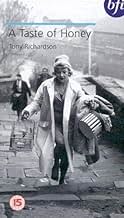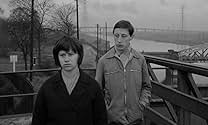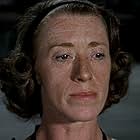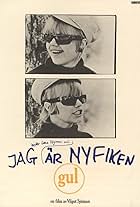IMDb RATING
7.4/10
6.6K
YOUR RATING
A pregnant teenage girl must fend for herself when her mother remarries, leaving the girl with only a new male friend for support.A pregnant teenage girl must fend for herself when her mother remarries, leaving the girl with only a new male friend for support.A pregnant teenage girl must fend for herself when her mother remarries, leaving the girl with only a new male friend for support.
- Won 4 BAFTA Awards
- 10 wins & 7 nominations total
Michael Bilton
- Landlord
- (uncredited)
Eunice Black
- Schoolteacher
- (uncredited)
Hazel Blears
- Street Urchin
- (uncredited)
David Boliver
- Bert
- (uncredited)
Margo Cunningham
- Landlady
- (uncredited)
Shelagh Delaney
- Woman watching basketball
- (uncredited)
A. Goodman
- Rag and Bone Man
- (uncredited)
John Harrison
- Cave Attendant
- (uncredited)
Veronica Howard
- Gladys
- (uncredited)
Moira Kaye
- Doris
- (uncredited)
Linda Lewis
- Extra
- (uncredited)
Janet Rugg
- Girl on Pier
- (uncredited)
Featured reviews
A Taste Of Honey is primarily known for the debut of Rita Tushingham who became a star with this and has had a half century career. But for it's time it was a daring film exploring things we still didn't talk about in the USA. For instance there was that love that dared not speak its name.
This film is set in working class Manchester and the cinematography was reflective of a very grimy environment that single mom Dora Bryan is raising her daughter Tushingham in. Bryan's pushing 40, but she likes to party still especially with her new boyfriend Robert Stephens. Rita is clearly in the way.
Interracial love was something not talked of in the USA, but it's here as young Rita drifts into losing her virginity and getting pregnant by a black sailor Peter Danaquah. He goes off on a long sea voyage without knowing what has happened.
The British may be more frank in talking about it, but interracial love and sex was quite the same as here back then. You can bet the rent money that A Taste Of Honey got no bookings in our Dixie states.
But here next relationship is with Murray Melvin who is as my late British friend Jeff Barker would say was as 'gay as green shoes' which is apparently a British expression. No closet for this man in 1961. The omnipresent Code imposed the cone of silence around anything remotely hinting of homosexuality
Tushingham meets Melvin as a customer in a shoe store she works in and the two hit it off. He knows her plight and maybe sex might not be in the future for these two, it's plain they've got a nice friendship working and can support each other and the interracial child coming into the world.
A Taste Of Honey was based on a play by Shelagh Delaney which when it got to Broadway boasted an impressive cast of Angela Lansbury as the mother, Joan Plowright as the daughter, Nigel Davenport as the boyfriend of the mother, Andrew Ray as the gay friend and the sailor was played by a young Billy Dee Williams. I'd love to have seen that production.
Still no complaints about this film. Groundbreaking, touching, and entertaining.
This film is set in working class Manchester and the cinematography was reflective of a very grimy environment that single mom Dora Bryan is raising her daughter Tushingham in. Bryan's pushing 40, but she likes to party still especially with her new boyfriend Robert Stephens. Rita is clearly in the way.
Interracial love was something not talked of in the USA, but it's here as young Rita drifts into losing her virginity and getting pregnant by a black sailor Peter Danaquah. He goes off on a long sea voyage without knowing what has happened.
The British may be more frank in talking about it, but interracial love and sex was quite the same as here back then. You can bet the rent money that A Taste Of Honey got no bookings in our Dixie states.
But here next relationship is with Murray Melvin who is as my late British friend Jeff Barker would say was as 'gay as green shoes' which is apparently a British expression. No closet for this man in 1961. The omnipresent Code imposed the cone of silence around anything remotely hinting of homosexuality
Tushingham meets Melvin as a customer in a shoe store she works in and the two hit it off. He knows her plight and maybe sex might not be in the future for these two, it's plain they've got a nice friendship working and can support each other and the interracial child coming into the world.
A Taste Of Honey was based on a play by Shelagh Delaney which when it got to Broadway boasted an impressive cast of Angela Lansbury as the mother, Joan Plowright as the daughter, Nigel Davenport as the boyfriend of the mother, Andrew Ray as the gay friend and the sailor was played by a young Billy Dee Williams. I'd love to have seen that production.
Still no complaints about this film. Groundbreaking, touching, and entertaining.
During the late fifties and early sixties a feature of the British film industry was what have become known as "kitchen sink" films- social-realist pictures focusing on the lives of ordinary working-class people. Tony Richardson was one of the key figures in this movement, and "A Taste of Honey" is one of a number of such films directed by him; others include "Look Back in Anger" from 1958 and "The Loneliness of the Long-Distance Runner" from 1962. All of these films are based upon literary sources, in the case of "A Taste of Honey" upon a play by Shelagh Delaney.
The main character is Jo, a working-class Manchester teenager. The plot is a fairly simple one and charts Jo's relationships with her sluttish mother Helen, her sailor boyfriend Jimmy, Helen's car-dealer lover (and later husband) Peter and Geoff, the young man who befriends Jo after Jimmy disappears back to sea leaving her pregnant. There are a number of fine performances, from Murray Melvin as the gentle, sensitive Geoff, Dora Bryan as the promiscuous Helen and from Robert Stephens as the relatively affluent but coarse and vulgar Peter. The best is probably from the nineteen-year-old Rita Tushingham, making her screen debut as the naïve and vulnerable yet determined and strong-willed heroine. She was to become a well-known figure in the British cinema of the sixties and seventies, even though she was far from having classic "film star" looks.
The film contains a number of elements which would have been highly controversial in the early sixties, in particular its non-judgemental attitude towards premarital sex and pregnancy and the mixed-race love affair between Jo and Jimmy. The British cinema was, in some respects, more liberal than its American counterpart at this period. I cannot imagine the Hollywood of 1961 making a film about a sexual relationship between a black man and a white woman. Still less can I imagine a Hollywood film about a sexual relationship between a black man and a white teenage girl, a theme which would probably still be off-limits in 2008.
There were, however, limits to British liberalism. A number of reviewers have assumed that Geoff is gay. Certainly, Melvin plays him with what might be seen as stereotypically gay characteristics- he is, for example, rather effeminate in his voice and gestures. He is also much more "domesticated" than Jo, being better than her at cooking, needlework and housekeeping. He is never, however, identified in the script as a homosexual; there is no reference to his having sex with, or being sexually attracted to, other men. Indeed, it is suggested that Geoff is romantically in love with Jo, and he even proposes marriage.
It should be remembered that, at the time this film was being made homosexuality was still illegal in Britain and there had never been a British film with an explicitly gay theme; the first such was "Victim", which opened in August 1961, only a month before "A Taste of Honey". When "The Trials of Oscar Wilde" came out the previous year it refused to admit that Wilde actually was a homosexual, but rather tried to give the impression that he was the victim of unfounded gossip, of a deliberate conspiracy to blacken his name and of perjured evidence.
Like a number of "kitchen sink" films, it has a strong sense of place, conjured up by its atmospheric black-and-white photography of Manchester scenes, especially the terraced houses of the working-class districts. We see recognisable landmarks such as the city's Town Hall, the Ship Canal and Blackpool Tower (Like many working-class Mancunians from this period, Jo and Helen take their holidays in Blackpool).
Another notable feature of the film is the presence of children. The film opens and closes to the accompaniment of the nursery rhyme "The Big Ship Sailed on the Alley-Alley-O", and in several scenes we see children playing outside. (Among them, apparently, is the future Government minister Hazel Blears). Richardson's intention was presumably to contrast the innocence of childhood with the cares of adult life and to stress that Jo is little more than a child herself. Indeed, when the film opens she is still a schoolgirl, probably aged fifteen, that being the age when most pupils left school in the early sixties, unless they were intending to obtain formal educational qualifications such as O-levels. Delaney herself was only seventeen when she wrote the play on which the film is based.
"A Taste of Honey" perhaps lacks the dramatic power of some of the social-realist films of this period, such as J. Lee Thompson's "Tiger Bay" or John Schlesinger's "A Kind of Loving". It is, however, a sensitive, well-acted and occasionally humorous look at human relationships and one of the better British films from this period. 8/10
The main character is Jo, a working-class Manchester teenager. The plot is a fairly simple one and charts Jo's relationships with her sluttish mother Helen, her sailor boyfriend Jimmy, Helen's car-dealer lover (and later husband) Peter and Geoff, the young man who befriends Jo after Jimmy disappears back to sea leaving her pregnant. There are a number of fine performances, from Murray Melvin as the gentle, sensitive Geoff, Dora Bryan as the promiscuous Helen and from Robert Stephens as the relatively affluent but coarse and vulgar Peter. The best is probably from the nineteen-year-old Rita Tushingham, making her screen debut as the naïve and vulnerable yet determined and strong-willed heroine. She was to become a well-known figure in the British cinema of the sixties and seventies, even though she was far from having classic "film star" looks.
The film contains a number of elements which would have been highly controversial in the early sixties, in particular its non-judgemental attitude towards premarital sex and pregnancy and the mixed-race love affair between Jo and Jimmy. The British cinema was, in some respects, more liberal than its American counterpart at this period. I cannot imagine the Hollywood of 1961 making a film about a sexual relationship between a black man and a white woman. Still less can I imagine a Hollywood film about a sexual relationship between a black man and a white teenage girl, a theme which would probably still be off-limits in 2008.
There were, however, limits to British liberalism. A number of reviewers have assumed that Geoff is gay. Certainly, Melvin plays him with what might be seen as stereotypically gay characteristics- he is, for example, rather effeminate in his voice and gestures. He is also much more "domesticated" than Jo, being better than her at cooking, needlework and housekeeping. He is never, however, identified in the script as a homosexual; there is no reference to his having sex with, or being sexually attracted to, other men. Indeed, it is suggested that Geoff is romantically in love with Jo, and he even proposes marriage.
It should be remembered that, at the time this film was being made homosexuality was still illegal in Britain and there had never been a British film with an explicitly gay theme; the first such was "Victim", which opened in August 1961, only a month before "A Taste of Honey". When "The Trials of Oscar Wilde" came out the previous year it refused to admit that Wilde actually was a homosexual, but rather tried to give the impression that he was the victim of unfounded gossip, of a deliberate conspiracy to blacken his name and of perjured evidence.
Like a number of "kitchen sink" films, it has a strong sense of place, conjured up by its atmospheric black-and-white photography of Manchester scenes, especially the terraced houses of the working-class districts. We see recognisable landmarks such as the city's Town Hall, the Ship Canal and Blackpool Tower (Like many working-class Mancunians from this period, Jo and Helen take their holidays in Blackpool).
Another notable feature of the film is the presence of children. The film opens and closes to the accompaniment of the nursery rhyme "The Big Ship Sailed on the Alley-Alley-O", and in several scenes we see children playing outside. (Among them, apparently, is the future Government minister Hazel Blears). Richardson's intention was presumably to contrast the innocence of childhood with the cares of adult life and to stress that Jo is little more than a child herself. Indeed, when the film opens she is still a schoolgirl, probably aged fifteen, that being the age when most pupils left school in the early sixties, unless they were intending to obtain formal educational qualifications such as O-levels. Delaney herself was only seventeen when she wrote the play on which the film is based.
"A Taste of Honey" perhaps lacks the dramatic power of some of the social-realist films of this period, such as J. Lee Thompson's "Tiger Bay" or John Schlesinger's "A Kind of Loving". It is, however, a sensitive, well-acted and occasionally humorous look at human relationships and one of the better British films from this period. 8/10
'A Taste of Honey' provides a grim slice-of-life look at the working class poor in early 1960's England. Teen pregnancy, an openly homosexual companion, a negligent single mother and homelessness are featured- mainstream topics in today's movies, but this was released in 1961, folks (beats me how they got it past the censors). This sensitive, remarkable film should be required viewing for junior high schools.
I first watched this film when I was about 14 years old sat at home with my mam and dad and I was absolutely riveted. Ever since then I have kept an eye out for it in the TV listings but never spotted it until now !...they have finally released it on DVD and it was worth the wait. The black and white photography is stunning, painting a grey stark picture of life in the poverty stricken back streets of Salford and Eccles in the late 50's and early 60's. I grew up around most of the locations, many of the streets are now bulldozed and many of the historical landmarks are now set against different backdrops...maybe not as grim, but in my opinion not as interesting or compelling. The theme of the film is warm and loving giving a realistic picture of people in the area at that time..friendly, caring, enjoying life when they can as life could be hard, poor housing, low wages the dirt and grime of living and working in the post war northern inner city.
Barton Swing Bridge and the Manchester Liners Shipping Company, Old Trafford Football Ground - complete with floodlight pylons, the atmosphere of a back street boozer and Blackpools brightly lit amusements are seen in all their grim Majesty.
The acting is tremendous,Dora Bryan superbly cast as the selfish mother...she should have gone on to stronger roles after this performance. Rita Tushingham the gawky teenager full of youthful wonder of her harsh world and Murray Melvin as the young adolescent battling with his sexuality and feelings for the enchanting Tushingham.
It really is a must see for anyone interested in this genre or who lives or has worked around Manchester. It shows the hope and warmth of people who have nothing, who only maybe aspire to a simple life...but who have had a Taste Of Honey.......
Barton Swing Bridge and the Manchester Liners Shipping Company, Old Trafford Football Ground - complete with floodlight pylons, the atmosphere of a back street boozer and Blackpools brightly lit amusements are seen in all their grim Majesty.
The acting is tremendous,Dora Bryan superbly cast as the selfish mother...she should have gone on to stronger roles after this performance. Rita Tushingham the gawky teenager full of youthful wonder of her harsh world and Murray Melvin as the young adolescent battling with his sexuality and feelings for the enchanting Tushingham.
It really is a must see for anyone interested in this genre or who lives or has worked around Manchester. It shows the hope and warmth of people who have nothing, who only maybe aspire to a simple life...but who have had a Taste Of Honey.......
The 1960's brought about many of my favourite films about the English working class experience: The Loneliness of the Long Distance Runner; Saturday Night, Sunday Morning; This Sporting Life and - naturally - Kes. Coming from the North and being around - just - during the sixties helps naturally.
I dislike the term "kitchen sink" because it puts too many people off a film that while bleak remains so true it almost hurts. There isn't a word, phrase or scene in this movie that I don't believe and remember: I was there, although not in Salford!
A dimly lit world of booze, cups of tea, canals, seaside trips, bonfires, repressed emotions, unprotected sex (and what follows) and the limits and cheap thrills of the Northern English working class.
In 1961 this must have looked like the start of a new age of film. Real stories about real life. Almost a docu-drama in the modern parlance. However it never really happened. Why? Because there is more skill required than you might imagine and even this verges on going over the top. You could say it is tries to tick too many boxes. And isn't really true drama because it stops at a point in which so many threads remain loose.
(I suppose you could say it ends with the characters facing up to the realities that they have been so long running away from - but will they actually achieve it?)
Star of the show is Rita Tushington who never went on to do much with her career after being given the part of a lifetime to start it all off. Murray Melvin is also good as the homosexual boyfriend who wants to help out - although maybe in a misguided way.
A Taste of Honey has its limits and you could attack it for being snobbish. It is an artistic product born of the middle class - but it remains utterly true in a way that is mostly absent in cinema today.
I dislike the term "kitchen sink" because it puts too many people off a film that while bleak remains so true it almost hurts. There isn't a word, phrase or scene in this movie that I don't believe and remember: I was there, although not in Salford!
A dimly lit world of booze, cups of tea, canals, seaside trips, bonfires, repressed emotions, unprotected sex (and what follows) and the limits and cheap thrills of the Northern English working class.
In 1961 this must have looked like the start of a new age of film. Real stories about real life. Almost a docu-drama in the modern parlance. However it never really happened. Why? Because there is more skill required than you might imagine and even this verges on going over the top. You could say it is tries to tick too many boxes. And isn't really true drama because it stops at a point in which so many threads remain loose.
(I suppose you could say it ends with the characters facing up to the realities that they have been so long running away from - but will they actually achieve it?)
Star of the show is Rita Tushington who never went on to do much with her career after being given the part of a lifetime to start it all off. Murray Melvin is also good as the homosexual boyfriend who wants to help out - although maybe in a misguided way.
A Taste of Honey has its limits and you could attack it for being snobbish. It is an artistic product born of the middle class - but it remains utterly true in a way that is mostly absent in cinema today.
Storyline
Did you know
- TriviaShot exclusively on location, in Salford, Blackpool and a disused house in the Fulham Road in London that cost £20 a week to rent.
- GoofsWhile the teacher is reading from a book; at one point it cuts to two classmates who look back at Jo and start giggling. The cut is premature and makes no sense because when it cuts back to Jo, she is not doing anything to make them laugh. She is merely looking in a notebook. However it is in the next sequence of cuts when Jo begins to mimic the teacher thus causing the students to giggle.
- ConnectionsFeatured in Free Cinema (1986)
- SoundtracksThe Big Ship Sails
(uncredited)
Traditional English children's song
Sung during the opening and closing credits
- How long is A Taste of Honey?Powered by Alexa
Details
Box office
- Budget
- £121,602 (estimated)
- Gross worldwide
- $4,597
- Runtime1 hour 41 minutes
- Color
- Aspect ratio
- 1.66 : 1
Contribute to this page
Suggest an edit or add missing content



























